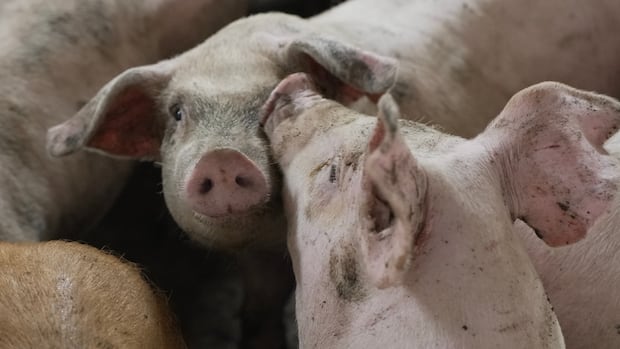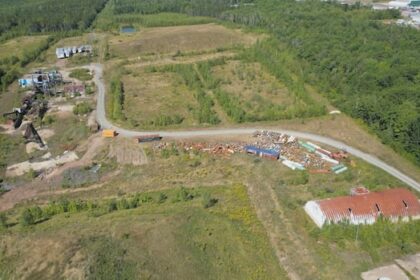ManitobaManitoba is developing a plan to cull and dispose of hundreds of thousands of pigs in the event of an African swine fever outbreak, an event agriculture officials call an “economic and animal welfare emergency” that would cost the province $3 billion in annual farm and food-processing revenue.’Economic and animal-welfare emergency’ would cost province $3B in annual farm and processing revenueBartley Kives · CBC News · Posted: Aug 19, 2025 6:00 AM EDT | Last Updated: August 19Hogs are shown in a southeastern Manitoba barn in this February 2025 file photo. The Manitoba government is developing a plan to respond to African swine fever if the disease ever makes it to Canada. (Tyson Koschik/CBC)Manitoba is developing a plan to cull and dispose of hundreds of thousands of pigs in the event of an African swine fever outbreak, an event agriculture officials call an “economic and animal welfare emergency” that would cost the province $3 billion in annual farm and food-processing revenue.The province issued a request for proposals last week for a consulting firm to develop an emergency response plan for African swine fever, which has killed millions of domestic pigs in Asia, central and eastern Europe and in sub-Saharan Africa, where wild pigs and ticks carry the virus that causes the disease without suffering any ill effects.While African swine fever (ASF) was first identified more than a century ago, it started to spread more rapidly in Asia in 2018 and has a toehold in the Western Hemisphere in Haiti and the Dominican Republic.If the virus ever makes it to Canada, “a large-scale welfare cull is needed to humanely euthanize and dispose of hundreds of thousands of pigs that cannot go to market,” Manitoba Agriculture’s animal health and welfare branch notes in its request for proposals.”An ASF outbreak in Canada will lead to immediate border closures with international trading partners,” the branch says, estimating the cost of a border closure to the Manitoba swine sector at $1.2 billion in lost farm and processing revenue over three months or $3.1 billion for an entire year.”Given the severe impact of ASF on swine health and international trade, an outbreak in Canada would be an economic and animal welfare emergency. To reduce this risk, Manitoba is collaborating with government and industry partners to proactively develop and refine a provincial welfare response plan should the disease arrive here.”The provincial animal health and welfare branch is now looking for a consultant to determine who will be responsible for responding to an outbreak within a number of government agencies as well as at private pork processors and hog producers such as Mississauga, Ont.-based Canada Packers, Steinbach’s HyLife and Niverville’s Progressive Group.The province is also looking for collaboration with other pork-producing provinces, particularly Alberta, Saskatchewan, Ontario and Quebec.”This response plan could also be applied to other types of disease outbreaks or emergency events,” the request for proposals notes.Workers in protective suits disinfect a pig farm as a preventative measure for African swine fever, in this 2018 file photo in Jinhua, Zhejiang province, China. (Stringer/Reuters)Cam Dahl, the general manager of Manitoba Pork, said one of the goals of the response plan is to reduce the duration of border closures, partly by working with authorities in the United States and Japan, where Manitoba sends most of its pork.”In Manitoba, 90 per cent of what we produce is exported,” Dahl said Monday, describing a border closure as “a big hit.”Glen Duizer, Manitoba’s chief veterinary officer, said the province started working on the emergency response plan following the rapid spread of African swine fever in 2018. He said the province needs the consultant to draw the component parts together and finalize a plan that co-ordinates the actions of multiple government agencies and private companies.”As long as we can continue to do that, we have a good chance of keeping it out. And even if we don’t, if we have that approach going into the disease, if it does enter into North America as a whole or even Canada more specifically, then we have a better chance of handling it,” Duizer said Monday.Poses no threat to peopleThe virus that causes African swine fever poses no threat to people and, unlike swine influenza, cannot jump to people or any animals other than pigs or old-world soft ticks.”ASF is a completely different virus. It’s in its own unique family of viruses, and there’s really only this one that causes significant disease in pigs,” Duizer said.”As that type of virus, it has no human health implications. It doesn’t infect people, it has not jumped to other species, so that makes it a fair bit different from other diseases, including influenza.”The ticks that carry African swine fever don’t live in North America, Duizer said. Neither do wild African pigs such as warthogs or bushpigs.Around the world, the virus is transmitted mainly by contact with infected live pigs as well as their feces, blood or even pork products, where the virus that causes the disease can survive for months or even years.That’s why hog producers are concerned with keeping people out of barns and otherwise strictly enforcing biosecurity regimes, Dahl said.”The most likely way of it coming in is it walking in with somebody from an airport … bringing in food from somewhere in an affected area,” he said.The increased use of dogs as surveillance at airport arrival areas is aimed at combating this scenario, he added.”That’s really what they’re looking for. They’re looking for food products,” Dahl said.According to the request for proposals, the province wants to have the emergency response plan in place by March 2026.Duizer said he’s pleased Canada has kept African swine fever out of the country for the past seven years and is also heartened the disease has been spreading elsewhere in the world more slowly over the past few years.”The risk is still present. That’s what it really boils down to, and we have to be cognizant of that risk and we have to do everything that we can to prevent it from coming in,” he said.Manitoba eyes plan to cull hundreds of thousands of pigs if African swine fever arrivesManitoba is developing a plan to cull and dispose of hundreds of thousands of pigs in the event of an African swine fever outbreak, an event agriculture officials call an “economic and animal welfare emergency” that would cost the province $3 billion in annual farm and food-processing revenue.ABOUT THE AUTHORBartley Kives joined CBC Manitoba in 2016. Prior to that, he spent three years at the Winnipeg Sun and then 18 at the Winnipeg Free Press, writing about politics, music, food and outdoor recreation. He’s the author of three books – two of them Canadian bestsellers – and the winner of a Canadian Screen Award for reporting.
Thursday, 5 Feb 2026
Canada – The Illusion
Search
Have an existing account?
Sign In
© 2022 Foxiz News Network. Ruby Design Company. All Rights Reserved.
You May also Like
- More News:
- history
- Standing Bear Network
- John Gonzalez
- ᐊᔭᐦᑊ ayahp — It happened
- Creation
- Beneath the Water
- Olympic gold medal
- Jim Thorpe
- type O blood
- the bringer of life
- Raven
- Wás’agi
- NoiseCat
- 'Sugarcane'
- The rivers still sing
- ᑲᓂᐸᐏᐟ ᒪᐢᑿ
- ᐅᑳᐤ okâw — We remember
- ᐊᓂᓈᐯᐃᐧᐣ aninâpêwin — Truth
- This is what it means to be human.
- Nokoma











